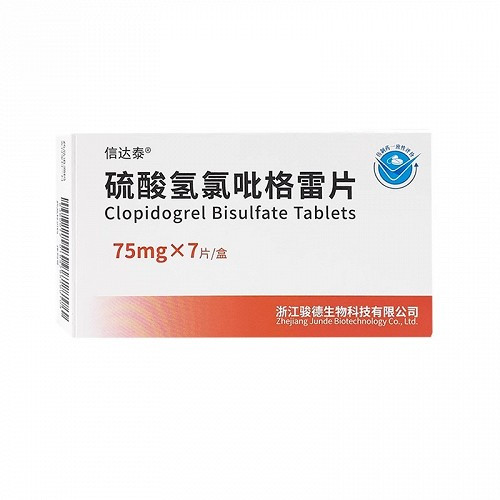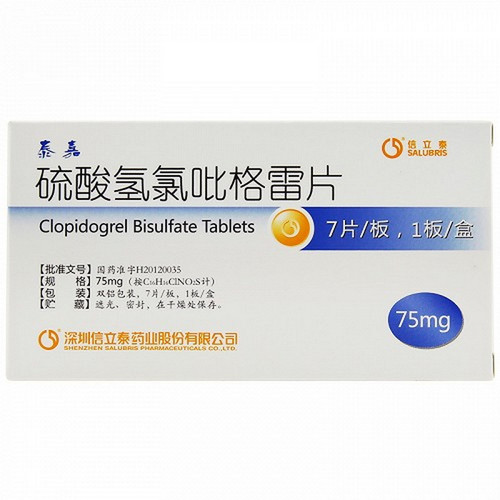Product Overview
[Drug Name]
Generic Name: Clopidogrel Hydrogen Sulfate Tablets
Trade Name: Xinlaile Clopidogrel Hydrogen Sulfate Tablets, 75mg x 7 tablets
[Main Ingredient]
Chemical Name: Methyl S(+)-2-(2-chlorophenyl)-2-(4,5,6,7-tetrahydrothieno[3,2-c]pyridin-5-yl)acetate sulfate. Molecular Formula: C₁₆H₁₆ClNO₂S·H₂SO₄. Molecular Weight: 419.90
[Properties]
This product is a film-coated tablet. After removal of the coating, it appears white or off-white.
[Indications/Main Functions]
Clopidogrel is indicated for the prevention of atherothrombotic events in the following patients: patients with recent myocardial infarction (from a few days to less than 35 days), patients with recent ischemic stroke (from 7 days to less than 6 months), or patients with established peripheral arterial disease. Patients with acute coronary syndrome (ACS) and non-ST-segment elevation ACS (including unstable angina or non-Q-wave myocardial infarction), including those with stent implantation after percutaneous coronary intervention, in combination with aspirin. For patients with ST-segment elevation ACS, in combination with aspirin, and may be used in conjunction with thrombolytic therapy.
[Precautions]
See package insert for details.
[Drug Interactions]
1. Hypersensitivity to the active substance or any of the ingredients in this product. 2. Severe liver damage. 3. Active pathological bleeding, such as peptic ulcer or intracranial hemorrhage.
[Specification]
75mg x 7 tablets
[Dosage and Administration]
Adults and elderly: The recommended dose of clopidogrel is 75mg once daily. Orally, with or without food. For patients with acute coronary syndromes: Patients with non-ST-segment elevation acute coronary syndromes (unstable angina or non-Q-wave myocardial infarction) should be initiated with a single loading dose of clopidogrel 300 mg (combined with 75-325 mg/day aspirin), followed by a continuous dose of 75 mg once daily. Because higher doses of aspirin are associated with a higher risk of bleeding, a maintenance dose of aspirin of no more than 100 mg is recommended. The optimal duration of treatment has not been formally established. Clinical trial data support a 12-month course, with maximal efficacy observed after 3 months (see Clinical Trials). For ST-segment elevation acute myocardial infarction: Patients should be initiated with a loading dose of clopidogrel, followed by 75 mg once daily, combined with aspirin, with or without a thrombolytic agent. Do not use a clopidogrel loading dose in patients over 75 years of age. Combination therapy should be initiated as soon as possible after symptom onset and continued for at least 4 weeks. No studies have demonstrated the benefit of combined use of clopidogrel and aspirin for more than four weeks (see [Clinical Trials]). For patients with recent myocardial infarction (from a few days to less than 35 days), recent ischemic stroke (from 7 days to less than 6 months), or established peripheral arterial disease: The recommended dose is 75 mg daily. If a dose is missed: Within 12 hours of the usual dose: The patient should immediately take a standard dose and take the next dose at the usual time. More than 12 hours after the usual dose: The patient should take the standard dose at the next usual time without doubling the dose. Children and Adolescents: Safety and efficacy in patients under 18 years of age have not been established. Renal Impairment: There is limited experience in the treatment of patients with renal impairment. (See [Precautions]). Hepatic Impairment: There is limited experience in the treatment of patients with moderate hepatic impairment who have a bleeding tendency. (See [Precautions]).
[Adverse Reactions]
See package insert for details.
[Contraindications]
1. Hypersensitivity to the active substance or any of the ingredients of this product. 2. Severe hepatic impairment. 3. Active pathological bleeding, such as peptic ulcer or intracranial hemorrhage.






